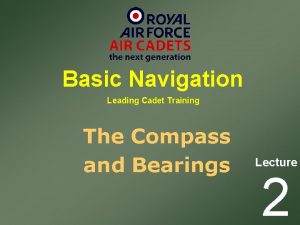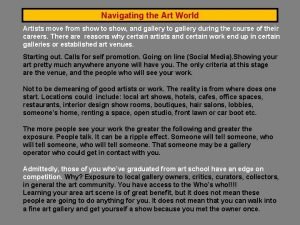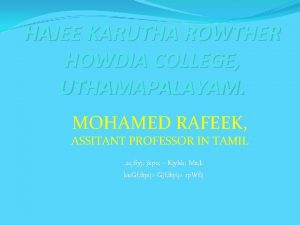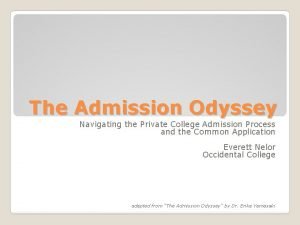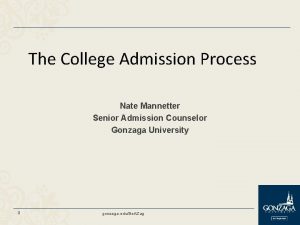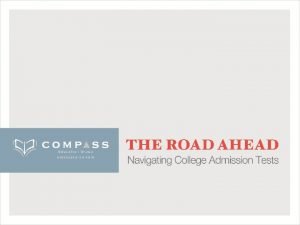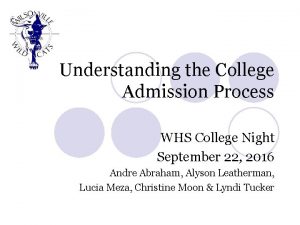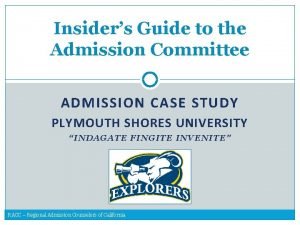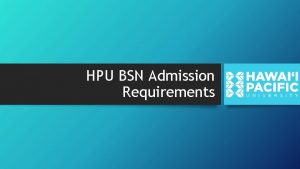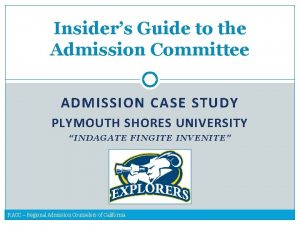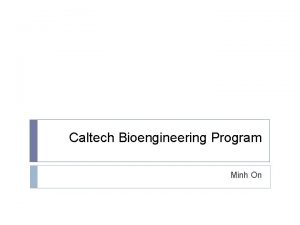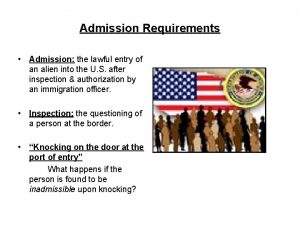College admission Navigating the process College admission Is




















- Slides: 20

College admission Navigating the process

College admission… Is not a prize to be won; it is a match to be made. • Choose a car • 8 first choices • Finding your people – • who you are vs. who you want to be • Your learning style • Inside – Out

Approximate Timetable • Summer before 12 th grade: • Identify colleges to consider applying to • You make 2 of the three decisions! • Begin “roughing out” personal essays • Investigate thoroughly the tests you must take. Register for them. Some schools are test optional.

Money • Family talk about money! § Applying, visiting, testing § The cost of college • Investigate funding options, policies, scholarships, deadlines, forms, etc.

Approximate Timetable • Fall of 12 th grade: • Create “final list” of colleges • Speak to teachers and counselor about letters of recommendation • Finalize essays • Apply: • For Early Decision/Early Action, usually in November • For Regular Decision, usually in late December or January

After you apply • Your school sends Mid-year grades (January. February) • Other academic updates (not awards or certificates!) • Common Reply Date May 1 • Wait list options— § Need to respond to be “active” § Offers typically May-June • One final transcript • Commitment to enroll

Application Components • Common Application vs. Other Options • Personal & Family section • Academic Information • Extracurricular Information • Writing section & supplement(s) • Information that the specific college wants

Pieces of the Puzzle Academic Information • The context is critically important • Transcript (grades, rigor of academic program, etc. ) • Scores (SAT or ACT, TOEFL, SAT subject exams, AP, etc. ) • Recommendations from counselor and teachers § Which teachers and how many? § Again, you can exercise some control.

Pieces of the Puzzle • Extracurricular Information: • How do you spend your time? Per week/ per year/ how many years? Show level of commitment to each activity? • How diverse a range or how concentrated? • Programs/ internships/ research • Things you may not think of: travel, family responsibility, work, hobbies

Special Talents • What about special talents or leadership (artistic, athletic, other)? Samples of talent (ONLY if you are good enough for it to make a difference, and ONLY if the college wants it!) • Example: Portfolio of artistic talent (music, dance, drawings/paintings, research papers, images of maker material, etc. )

Pieces of the Puzzle • Personal Information: • Basic information about you and your family • Essays • Things you might also contribute: • Interviews (depending if they are available and when) • Additional letters of recommendation (ONLY if they will shed new light!) • ONLY give us what we ask for; • don’t be “gimmicky”

Various Application Programs & Terminology • Early vs. Regular Decision vs. Rolling • Early Action, Early Decision, Early Notification, etc. • Need Blind vs. Need Aware • Demonstrated interest • Institutional Priorities

What do selective colleges do with this information? How does the selection process work? • The Challenge: Selective colleges have many more highly qualified applicants than we can admit. • It is not simply finding out who can succeed in class or who meets minimum eligibility

Crafting a Class • The Goal: To admit the most diverse and interesting “mix” of students possible from different backgrounds and experiences. • Types of diverse qualities: intellectual, geographic, socio-economic, cultural, extracurricular, talents and expertise. (i. e. , not simply the “smartest” freshman class!) • Why? Students learn just as much from each other as they do from their professors.

Crafting a Class • The Solution: Create a highly personalized, nuanced, and labor-intensive decision-making process that evaluates the credentials of each candidate in the context of opportunities available • It is not formulaic (i. e. , no GPA or score “cut-offs”) • It can seem subjective sometimes • It is people making judgments given the information in front of them – in the application • It is NOT a referendum on how worthy you are as a person

What we look for and look at • Academic information is FIRST & FOREMOST • But: • 80 -90% of applicant pool is usually academically qualified to be successful • Very few students are admitted for academic reasons alone (usually a combination of factors are involved) • The more selective the college, the more difficult it is to stand out in the applicant pool purely on academics

What do we hope to find? • Will vary by college and sometimes by the academic program within the institution • Evidence of curiosity, self-motivation, discipline, initiative, resilience • Passion in your approach to your life and your studies • Maturity, selflessness, perspective • How has a student contributed to make the community a more interesting place? How might that translate in the context of a college community?

What do we hope to find? • Who is the real person behind the grades and scores? • Be authentic! Don’t “second guess” what you think the application reader wants to hear! • Does this person seem like someone you would want around the seminar table, as a roommate, a dinner partner, or on a team? • You are creating a narrative for us!

6 Tips 1. Find YOU. Go Inside- Out. 2. You are creating a narrative for us! 3. This is NOT a referendum on how worthy you are as a person. 4. Finding a good learning environment 1. Research vs. teaching 5. Net Price Calculator 6. Common Data Set

Questions The answer is probably: “It depends” ; -)
 Navigating the body
Navigating the body Navigating the digital landscape
Navigating the digital landscape Cadet rule in navigation
Cadet rule in navigation Bearings trigonometry
Bearings trigonometry Gdpr compliance aws
Gdpr compliance aws Navigating the art world
Navigating the art world Aws iaa
Aws iaa Enquiry letter for admission
Enquiry letter for admission Hajee karutha rowther howdia college admission
Hajee karutha rowther howdia college admission Tarrant county college admission requirements
Tarrant county college admission requirements Different types of admission in hospital
Different types of admission in hospital Hình ảnh bộ gõ cơ thể búng tay
Hình ảnh bộ gõ cơ thể búng tay Ng-html
Ng-html Bổ thể
Bổ thể Tỉ lệ cơ thể trẻ em
Tỉ lệ cơ thể trẻ em Gấu đi như thế nào
Gấu đi như thế nào Chụp tư thế worms-breton
Chụp tư thế worms-breton Bài hát chúa yêu trần thế alleluia
Bài hát chúa yêu trần thế alleluia Môn thể thao bắt đầu bằng chữ đua
Môn thể thao bắt đầu bằng chữ đua Thế nào là hệ số cao nhất
Thế nào là hệ số cao nhất Các châu lục và đại dương trên thế giới
Các châu lục và đại dương trên thế giới


